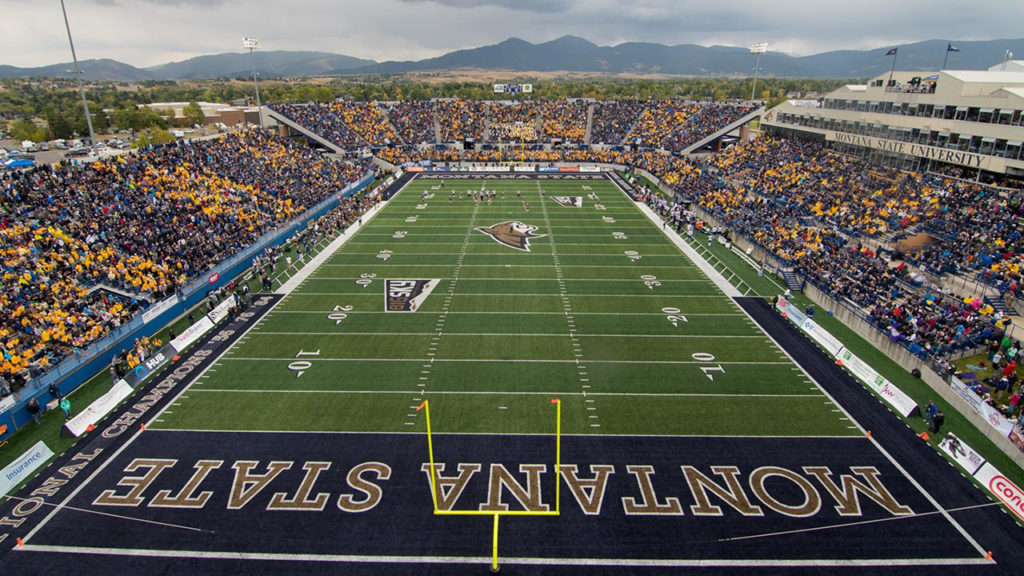
With the 2020 college football season in flux and seemingly shrinking day by day, the financial impact of a COVID-19 pandemic-slammed season will be felt by entities big and small.
It’s sometimes a little stunning to add up the revenues generated by college football, ranging from media rights and marketing spending to university budgets to gameday spending by fans both in the stadium and in the surrounding community. At the Power Five conferences alone, college football generates some $4.1 billion by some estimates, with billions more generated from fan and student spending.
With the Big Ten, Pac-12 and SEC all canceling nonconference games, the ACC announced a 2020 plan that calls for 10 conference games with the one-year addition of Notre Dame to the ranks, as well as a single nonconference game. The schedule would begin the week of Sept. 7-12, and the nonconference games are limited to the home state of the ACC member. All television revenue for the 2020 season, including Notre Dame’s home games broadcast by NBC, will be shared equally by all 15 institutions, and the ACC Football Championship Game will be played on either December 12 or 19 at Bank of America Stadium in Charlotte, North Carolina, featuring the top two teams based upon highest conference-game winning percentage.
It is an interesting move: at a time when many universities are looking to break early in the fall, the ACC has shifted the season later on the calendar. For Notre Dame, the move was made of necessity: with Wisconsin, Southern Cal and Stanford off the Fighting Irish slate, the university scrambled to assure itself of enough quality opponents.
Of course, all of this could be moot if in a week or two college presidents decide to postpone the 2020 college football season to spring 2021. These plans seem tenuous, at best.
If the 2020 season is postponed or canceled, there would be an immediate impact on Disney, whose ESPN/ESPN+ and ABC game broadcasts generate some $793 million in advertising annually, according to the Standard Media Index, dwarfing college-football ad revenues at Fox and CBS. Not all this revenue would disappear if the college football season is scrapped, but there will certainly be a cascading effect in the Disney ecosystem: we may see fans cancel their cable subscriptions and cutting the cords, while other may drop their ESPN+ subscriptions.
As mentioned, the college programs relying on football revenues will also take a hit. For instance, Athletic Director Barry Alvarez says the move to a conference-only schedule could cost the University of Wisconsin athletic department some $60 million to $70 million in revenue. If football is canceled, the total hit would be over $100 million. The University of Wisconsin is in a unique situation in college football, as the athletic department does not rely on school subsidies and has a $190 million reserve fund administered by the UW Foundation. Most schools do not have such reserves, so scaling back because of COVID-19 issues will cause considerable impacts across the college-football spectrum.
The potential loss of the college football season will also impact communities big and small that rely on gameday spending. Take the case of Bozeman, Montana, home to Montana State University. Bozeman has already been hit hard by consumer-travel cutbacks—it’s the busiest gateway city for Yellowstone National Park, but overall tourism numbers are way down—and businesses there are bracing for a second impact if the Big Sky Conference postpones or cancels the 2020 football season. The conference has already pushed back the start of fall sports save football, and a decision on the season schedule is expected shortly.
In a smaller city like Bozeman, any cutbacks to the college-football season would be felt throughout the business community. Even if the full season is played, you’re unlikely to see Bobcat Stadium crammed with fans because of social distancing, and attendees staying away because of COVID-19 concerns. From the Bozeman Daily Chronicle:
Rocking R Bar owner Mike Hope said Bobcat home games lead to a 30% increase in business on those Fridays, Saturdays and Sundays. Stuart Doggett, Montana Lodging and Hospitality Association executive director, described a potential lack of football season as “economically harmful.”
“College sporting events have a positive impact on hotels, bars and restaurants who benefit from the influx of these people attending local events and spending money,” Doggett wrote in an email. “Forgoing college football in 2020 would be another blow to the lodging/hospitality industry in addition to what has been the most difficult time in our history.”
Each spring, Mickelson said, rooms for the fall fill up based on Montana State’s schedule. Home game weekends usually correlate to sold-out hotels. The GranTree calls the block of rooms it saves “football regulars.” The same people who buy season tickets each year and are part of MSU’s booster clubs frequently stay at the hotel.
It’s important to note that player safety is cited as a major factor in scheduling decisions by the likes of Alvarez and the college presidents; no one wants to see COVID-19 outbreaks among student athletes. The impacts of a shutdown, however, still must be measured as part of the total cost of the COVID-19 pandemic.
Photo of Bobcat Stadium on game day courtesy Montana State University.
RELATED STORIES: New 2020 SEC schedule: delayed season start, conference-only games; Big Ten cuts nonconference games from 2020 football season; Could 2020 college football season be delayed to spring 2021?; More schools announce in-person fall semesters as planning for NCAA football season continues; Surprise: We may see NCAA football this fall; Emmert: Colleges need to open before NCAA sports resume; Trump: 2020 NFL season should start in September
